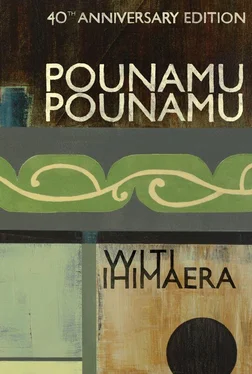I hear my mother weeping softly, softly, and I cannot restrain my sorrow. For she is my mother and I am her son.
‘Hello, Tama.’
‘Mum, are you all right? Mum, don’t cry Mum.’
‘Come home,’ my mother says. ‘Come home, come home, come home, come home.’
Over and over again, she calls to me.
‘Mum, please don’t cry Mum, please.’
‘Come home, Son, come home and comfort me. I am alone now. Come home, come home.’
You must always look after your younger sisters and brothers, Tama. Your mother too, if I should die. Remember, Tama, always.
Yes, Daddy.
You are the eldest. That is your duty, your obligation. I was taught that as a child. I teach you that now.
Be at peace, Tama. You spoke well and you were your father’s son. Be at peace. But do not rest. Look upon the mourners. They come from the shadows and from the light to share their grief with you. Haere mai, mokopuna, the old people whisper. Come and press noses with us and let us join our sorrow. Haere mai, mokopuna. Do not be too sad for we also grieve with you.
‘We’re truly sorry, Tama.’
‘Thanks Mr Ralston. Thanks Tim. Thanks Bob.’
I must shake the hands of my friends and receive their condolences. Yet if I look into their faces they look away from me, as if death is something that should not be admitted.
‘We’re truly sorry, Tama.’
Why are they sorry, Daddy? Why are they sad?
Because your Nani Teria was a good lady. Some of them realise now. And now they are sad.
Is that why they kiss her? Must I kiss her?
You won’t see your Nani after this day.
Then one last kiss, Nani.
I bend down upon my Nani’s body. Nani does not breathe any more.
Goodbye, Nani.
Your people mourn with you, Tama. Embrace them and let them weep on your shoulder. The men weep, the women weep, the children weep because the men and women weep. This is a sad day. These are the people of your whanau. You have lost a father. They also have lost a father, a brother, a son, a friend. This is your family, this is your home. You are their son too, Tama.
‘Auntie Mina came from Tauranga this morning,’ Marama says. ‘And Uncle Pita arrived this afternoon. Uncle Pita’s been a great help. He did all the arrangements at Rongopai. Jackie and Arapata dug the hangi. A lot of people are coming. A lot of people to feed. Don’t know where we’re going to put them all.’
‘What about in the old homestead, at Nani’s place?’
‘Yes, some there. But most of them in a marquee near the meeting house. The homestead is too small.’
Don’t close the door, Daddy. Leave it open so that there is light. As long as I see the light burning, I’m not afraid.
You shouldn’t be afraid, Tama. You’re a big boy now.
And it is time to get on with life. The sun always rises. You are a seed that was sown at Raiatea.
One step. Then one step further now, to where my father lies alone and lonely under the harsh light.
Listen, Tama. A lone voice sings among the soft sounds of mourning. The voice of a kuia, your Auntie Ruihi. She sings an ancient lament which soars and swoops and curls above the hushed assembly. Look where she comes, slowly stepping from the darkness, her black gown threaded with green leaves, her hands outstretched, in each hand a sprig of greenery. She performs movements to her song. Slowly her hands move, with intricate precision, telling of the grief which tears at her heart. Some of the mourners join her song and perform the movements along with her. But she looks straight ahead, her face luminous with grief. She looks at you, Tama, her brother’s son. Only you.
I watch my Nani going away into the earth. The earth is soft and wet because it is raining. Daddy’s hands are tight upon my shoulders.
Nani’s belongings are thrown into the hole. I see a picture of Nani fall. The glass smashes, but she is still smiling.
Goodbye, Nani.
Dirt falls upon Nani, shovel after shovel. And as she disappears, Auntie Ruihi starts a frenzied wailing.
Auntie Ruihi, please don’t cry. Please Auntie, don’t cry, don’t, please.
Listen to your aunt’s lament, Tama. Listen. She opens her arms to you. Through the spray of my gushing tears, she sings, I see you, my brother’s son. Come weep with me, our anchor is gone, and we are cast adrift at the mercy of the sea.
Embrace your aunt, Tama. Weep with her. You have only lost a father. She has lost both parents and now her eldest brother. She has nobody who will look after her now. Weep with her, Tama. Kiss her once more. Aue, mokopuna, she weeps. Aue, aue, as she dissolves into the darkness.
You are alone now. Your father is on the marae. Your mother and brothers and sisters wait for you to join them by their father’s side.
One step. Then one step further now.
You must always look after your brothers and sisters. And your mother too, if I should die.
‘Are you all right, Mum?’
‘Come home, Tama. Come home, come home, come home.’
‘Mum just sits beside Dad, knitting, knitting a jersey for him, knitting, just knitting.’
‘Come home, Son. Come home, come home.’
Step firmly, Tama. Do not listen to the wailing. It is only the wind shifting, only the wind renewing. Be proud. Your father waits among the flower wreaths. His body is draped with feather cloaks. Be proud.
‘You’ll have to come home, Tama. Dad’s dead.’
We won’t need Nani’s things. That is why they are buried with her.
‘I’m afraid, Marama.’
‘Kia kaha, Tama. Be strong.’
Almost there, Tama. Almost there. The long journey almost at an end. See? Your brothers and sisters raise their arms to greet you. One step. Now another. And one step further now.
Are you old, Daddy, like my Nani Teria is old?
No, Tama.
Don’t grow old, Daddy.
One day I will be old. Then I shall die.
No you won’t. I won’t let you.
One day, Tama.
Embrace your brothers and sisters, Tama, and be strong. You are the eldest. Embrace your mother, Tama. Do not listen to the wailing. Now, slowly look upon your father. Rest your arms on his casket and weep for him.
Daddy, where are you? It is dark and I can hear the wailing coming from the marae.
He was an old man, Tama. See how he sleeps. His eyes are closed and his face is pale in the blazing light. He is covered with feather cloaks. His face is cold. His hands are cold. The wind blows upon him and ruffles his grey hair. For three days he will lie here. Then on the afternoon of the third day, his casket will be closed and you will not see him again. On that day, you will help carry him up the hill to the family graveyard. He will be heavy, but you must be strong. It will rain. It always rains when a Maori dies. Then he will be covered by the earth.
This is the last goodbye, Tama.
Bend towards him, Tama.
One last kiss, Father. Your lips, so cold, so cold.
Goodbye, Father.
Daddy, is it always so dark?
No, son, the sun always rises. Always.
Soon, Daddy?
Soon. And never forget, Tama:
E kore au e ngaro
He kakano i ruiruia mai
i Rangiatea
You are from a seed that was sown
in Rangiatea and you
will never be lost.
TANGI
This story had so many incarnations. I first wrote it way back in 1970 in Barry Mitcalfe’s class, where it was called ‘The Faraway Side of the Hour’. It was renamed ‘Tangi’ by Margaret Orbell and Tim Curnow when they read it in Exercises for the Left Hand and published it in Contemporary Maori Writing (1972), the first anthology of contemporary creative writing by Maori writers ever. I wrestled with the form of this story, not realising that the counterpointed nature of the narrative between the boy’s thoughts on death, the tangi of his father and the embedded story of the events leading up to the funeral was supplying me with a poetic structure for a longer work. I began that longer work after talking on the phone from London with my mother.
Читать дальше












